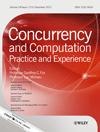New Trends in Adaptive Smart Systems, Services, and Architectures - SI at Wiley CCPE

New Trends in Adaptive Smart Systems, Services, and Architectures - AROSA2017 at Wiley CCPE
(Impact Factor: 0.942)
Smart Systems are composed of interconnected nodes (devices, services, components, etc.) that can be intelligent, mobile, embedded, cloud-based, or/and adaptive. These nodes interact together through new communication protocols. Architectures of such system needs to adapt its behavior and deals with change in the environment. An adaptive and reconfigurable architecture can repair itself if any execution problems occur, in order to successfully complete its own execution. In the design of an adaptive and reconfigurable software system, several aspects have to be considered. Also other emerging areas such as Big data can also be used to solve traditional problems of Smart Systems, like scalability and performance.
Topics
For this track, contributions are devoted to functional and
non functional adaptability and reconfiguration management
in service-oriented and component-based software systems.
Specifically, the relevant topics include, but are not
limited to:
- Monitoring simple and composite architectures, components and services
- Dynamic reconfiguration of cloud and smart applications
- Internet of things for smart systems
- Cloud-based Smart Systems
- Design for the diagnosability and repairability
- Big data for smart systems
- Mobile collaboration platforms and services
- Predictive management of adaptability
- Experiences in practical adaptive and reconfigurable architectures, services, and smart applications
- Tools and prototypes for managing adaptability of smart applications
- Smart systems architectures: Modeling, Validation, Verification, Scaling
Guest Editors
Khalil Drira, LAAS-CNRS and Univ de Toulouse, FranceMohamed Jmaiel, ReDCAD, Univ of Sfax, Tunisia
| Mehmet Aksit | Univ of Twente, Nederland |
| Isabelle Borne | Univ de Bretagne Sud, France |
| Christophe Chassot | LAAS-CNRS, France |
| Anis Charfi | Carnegie Mellon Univ, Qatar |
| Marco Comuzzi | UNIST, Korea |
| Marcos Da Silveira | CRP Henri Tudor, Luxembourg |
| Flavia Delicato | Federal Univ of Rio de Janeiro (UFRJ), Brazil |
| Mehdi Ahmed Nacer | Univ des Sciences et de la Technologie Houari Boumediene, Algeria |
| Mohammed Erradi | Ensias, Marocco |
| Nikolaos Georgantas | INRIA, France |
| Francisco Moo-Mena | FMAT-UADY, mexico |
| Mohamed Mosbah | LaBRI - Univ of Bordeaux, France |
| Elisa Yumi Nakagawa | Univ of Sao Paulo, Brazil |
| Mourad Oussalah | LINA Laboratory, Univ of Nantes, France |
| Saul Pomares | INAOE, Mexico |
| Claudia Raibulet | Univ of Milano-Bicocca, Italy |
| Salah Sadou | IRISA, Univ of South Brittany, France |
| Mohamed Sellami | ISEP, Paris, France |
| Chouki Tibermacine | LIRMM, CNRS,Montpellier II Univ, France |
| Qi Yu | Rochester Institute of Technology, USA |
| Haibin Zhu | Nipissing Univ, Canada |
| Amal Gassara | CRNS, Tunisia |
| Nesrine Khabou | Univ of Sfax, Tunisia |
| Cecilia Rubira | Institute of Computing, UNICAMP, Brazil |
| Slim Kallel | Univ of Sfax, Tunisia |
| Ismael Bouassida Rodriguez | Univ of Sfax, Tunisia |
| Samir Tata | IBM, USA |
| Dimka Karastoyanova | Kuhne Logistics Univ, Hamburg, Germany |
| Cinzia Cappiello | Politecnico di Milano, Italy |
| Henry Muccini | University of L'Aquila, Italy |
| Sakkaravarthi Ramanathan | E.G.S Pillay Engineering College, India |
| Bernd Freisleben | Univ of Marburg, Germany |